|
|
|
Sort Order |
|
|
|
Items / Page
|
|
|
|
|
|
|
| Srl | Item |
| 1 |
ID:
132034
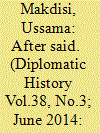

|
|
|
|
|
| Publication |
2014.
|
| Summary/Abstract |
The question of how to represent the U.S. role in the Middle East brings to the fore the question that Edward Said first raised in 1978 in Orientalism about the nature of American understandings of the Middle East. More than three decades after the publication of his book, Said's criticism of Orientalist scholarship-and his accompanying plea for a secular humanistic interpretation to replace it-remain both topical and enigmatic. It is one thing to criticize American representations of foreign cultures; it is an entirely different matter to study American engagements with them. These are by no means unrelated endeavors, but by the same token, they entail very different conceptions of what constitutes a field of inquiry and how to go about studying it comprehensively. The recent emergence of a more critical scholarship of America and the Middle East, therefore, begs the question of whether it is possible to write a history that takes both the Americans and Arabs equally seriously despite the prevailing political climate, and ultimately what kind of methodology this might entail for the rewriting of U.S.-Arab relations, and more broadly, American involvement in the world.
|
|
|
|
|
|
|
|
|
|
|
|
|
|
|
|
| 2 |
ID:
124743
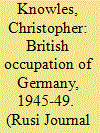

|
|
|
|
|
| Publication |
2013.
|
| Summary/Abstract |
Britain began to plan for the occupation and reconstruction of Germany following the end of the Second World War as early as 1944. However, such was the devastation as a result of intensive fighting that went all the way to Berlin that these plans were unsuited to the reality on the ground in May 1945. Christopher Knowles explores the first four years of 'benevolent occupation' in the British zone under the leadership of Field Marshal Montgomery and his successors, noting that positive effect was more likely where they created the conditions for the German people to act for themselves, rather than imposing solutions by force or decree.
|
|
|
|
|
|
|
|
|
|
|
|
|
|
|
|
| 3 |
ID:
132027
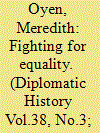

|
|
|
|
|
| Publication |
2014.
|
| Summary/Abstract |
An early battle in the war to gain greater equality for China on the international stage emerged in an unexpected place: Aboard ships around the world sailing for the Allied Merchant Marine. During the Second World War, at least twenty thousand Chinese seamen worked on mostly British ships. Chinese worked long hours, received lower wages than white sailors engaged in the same work, were never given the war risk bonus offered to keep other members of the crew on duty during periods of high risk, and were routinely denied shore leave at U.S. ports on the grounds that they posed a flight risk. In response, Chinese seamen deserted in uniquely high rates, en masse instead of one individual at a time. The nature and scope of the desertions threatened the success of the supply operation, leading the governments involved to come together to try to prevent them.This article explores the multilateral negotiations that endured as long as the war itself. These centered upon three of the most basic inequalities endured by Chinese sailors-unequal pay, lack of war risk bonuses, and lack of shore leave. Using government records from all three parties (the United States, Great Britain, and the Republic of China) as well as press and collections from private organizations, I demonstrate the ways in which racial inequalities ingrained in the international system hindered advances for the Chinese seamen, challenged the smooth management of both Anglo-Chinese and Chinese-American relations, and sparked conflict between the Nationalist Chinese government and the seamen themselves. The legacies of British colonialism in Asia and American exclusion of Chinese combined with wartime public opinion to push forward changes when international union efforts failed.
|
|
|
|
|
|
|
|
|
|
|
|
|
|
|
|
| 4 |
ID:
132029
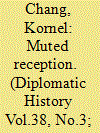

|
|
|
|
|
| Publication |
2014.
|
| Summary/Abstract |
During the Second World War, the United States developed a propaganda apparatus to counter fascist propaganda in Mexico, and later, in Latin America more broadly. Mobilizing the resources and expertise of Hollywood, multinational corporations, and the social sciences, the United States attempted to gauge and sway Mexican popular opinion. This concerted effort at mass persuasion marked the first time that the United States attempted to systematically shape inter-American relations by influencing popular public opinion directly. But this project to inculcate the Mexican masses with U.S. propaganda was marred by difficulties and mishaps that hindered and distorted its transmission. On the other side, Mexicans contested, negotiated, and resisted these overtures, indicating that the influence of U.S. propaganda was neither irresistible nor straightforward. This is a story, then, about U.S. wartime propaganda, how it was developed on the ground and its muted reception in Mexico.
|
|
|
|
|
|
|
|
|
|
|
|
|
|
|
|
| 5 |
ID:
131447
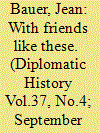

|
|
|
|
|
| Publication |
2013.
|
| Summary/Abstract |
In the summer of 1780, John Adams and the Comte de Vergennes crossed epistolary swords over America's status in the Franco-American Alliance. Understanding their irreconcilable policies explains how a minor dispute about paper money erupted into a fight over the control of post-war American commerce, which became a battle over the proper deployment of the French Navy in the New World, which led to mutual accusations of betrayal and treason. France thought the United States was its client state, bound to assist France against its enemies, particularly Great Britain. At the same time, American politicians followed the logic of the Model Treaty and "free ships make free goods" to claim America as a neutral state, free to sell its staple agricultural products to whomever offered the best price, including Britain. This difference underlies all the major conflicts of Franco-American relations through the end of the Napoleonic Wars.
|
|
|
|
|
|
|
|
|
|
|
|
|
|
|
|
|
|
|
|
|